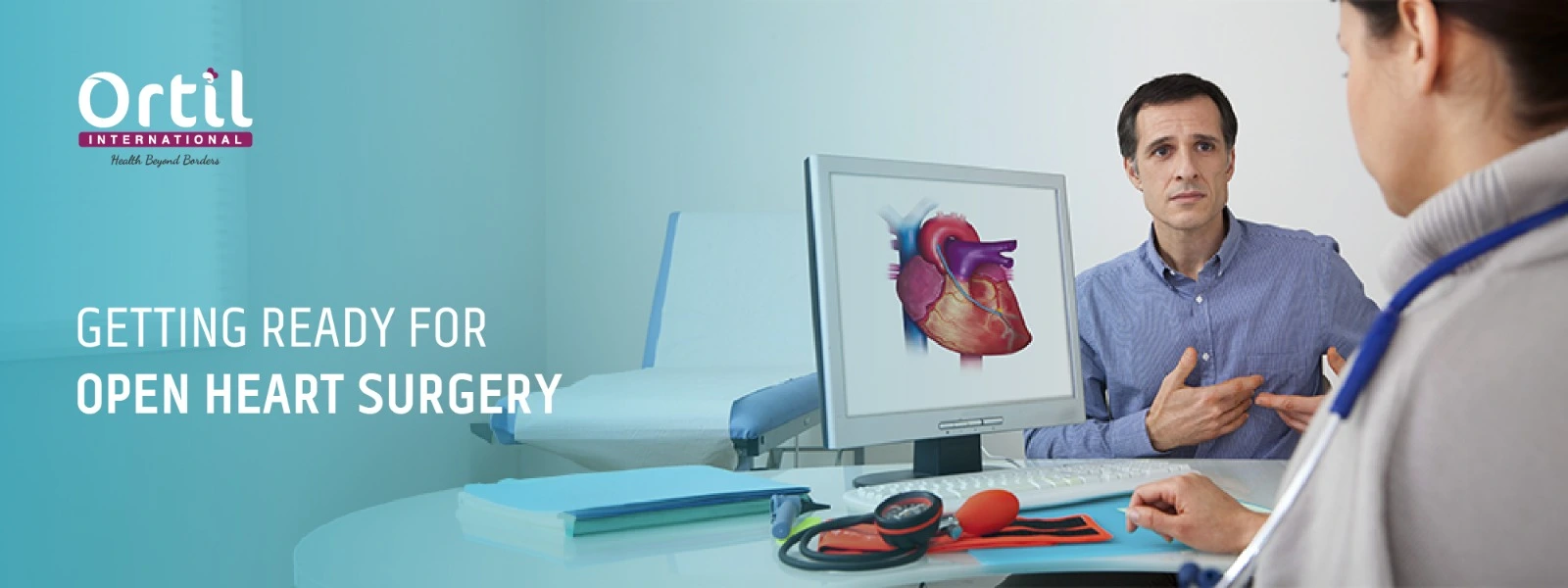All You Need to Know About Open-Heart Surgery
You may have heard about open heart surgery, but you may not be fully aware of what is open heart surgery. So, let’s dig into this topic and learn about the details of open heart surgery.
Open heart surgery involves making a large incision in the center of the chest to access the heart and perform any necessary procedures to treat the patient's present condition. It is performed when the patient is in good health and can tolerate it because it is a major surgery with many complications.

Your doctor may suggest open heart surgery when the procedure cannot be performed through a minimally invasive technique in which small incisions are made as compared to one large incision in the center of the chest.
If you have questions like what is the recovery time for open heart surgery, what happens in open heart surgery, or what can you do after heart surgery, then this blog will provide you with complete information.
What Medical Conditions Does Open-Heart Surgery Address?
Open heart surgery is suggested when the patient is suffering from a heart disease that cannot be treated with medications, changing lifestyles, and minimally invasive procedures. Some of the medical conditions in which open heart surgery is indicated are listed below:
- Coronary artery disease (CAD)
- Valvular heart disease (e.g., aortic stenosis, mitral regurgitation)
- Congenital heart defects
- Aneurysms of the aorta
- Cardiomyopathy
- Heart failure
- Arrhythmias (e.g., atrial fibrillation)
- Heart tumors
- Septal defects (e.g., atrial septal defect)
- Atrial myxoma
- Ventricular septal defect
- Tetralogy of Fallot
- Transposition of the great arteries
- Ebstein's anomaly
- Patent ductus arteriosus (PDA)
- Wolff-Parkinson-White syndrome
- Mitral valve prolapse
- Aortic dissection
Open heart surgery is a major type of surgery that is recommended to those patients with good health. Or it is suggested when the surgeons need to access the full heart and its surrounding blood vessels. In Open heart surgery, the surgeon may perform two procedures at a time. Some of the surgical procedures of open heart surgery are as follows:
- Coronary artery bypass grafting (CABG)
- Heart valve repair or replacement
- Aortic valve replacement
- Mitral valve repair or replacement
- Aortic aneurysm repair
- Atrial septal defect closure
- Ventricular septal defect repair
- Tetralogy of Fallot correction
- Fontan procedure
- Aortic root replacement
- Maze procedure for atrial fibrillation
- Ross procedure
- Tricuspid valve repair or replacement
- Pulmonary valve replacement
- Left ventricular assist device (LVAD) implantation
How Many Types of Open-Heart Surgery are there?
Open heart surgery can be performed in many ways. Most of the surgeon perform the surgery according to their skills and experience. Your doctor may tell you about the details of a procedure while recommending open heart surgery. Some of these types are:
- Median Sternotomy : In this type of open-heart surgery, the surgeon makes a large incision in the center of the chest and along the length of the breastbone to access the heart.
- Off-pump surgery (beating heart surgery) : In this technique, the heart continues to beat during the surgery, allowing the surgeon to perform procedures without using a heart-lung bypass machine.
- Robotic-assisted surgery : Robotic systems can also be used to perform some open-heart procedures requiring more precision and accuracy.
- On-pump Surgery : This is a traditional approach in which the heart is temporarily stopped, and a heart-lung bypass machine maintains blood circulation during the procedure.
What are the Preparations for Open-Heart Surgery?
Open heart surgery requires the preparation of both the patient and the surgeon. Some of the necessary preparations include:
- Consultation with your surgeon
- Medication adjustments
- Lifestyle modifications
- Preoperative tests
- Preoperative instructions
- Arrangements for recovery
- Mental and emotional preparation
What Occurs Before Undergoing Open-Heart Surgery?
Before undergoing open-heart surgery, you typically undergo the following:
- Diagnostic tests such as chest X-rays and an electrocardiogram (EKG) are conducted to help plan open-heart surgery procedures.
- Shaving of the chest area is performed.
- The surgical site is cleansed with a particular type of solution to keep the area sterilized.
- An intravenous line (IV) is inserted into your arm to administer fluids and medications.
What is the Procedure for Open Heart Surgery?
The procedure of open heart surgery involves the following steps:
Anesthesia and Preparation
The patient is prepared by keeping the vital signs stable, and then anesthesia is administered to make the patient unconscious during the procedure of open heart surgery.
Incision and Exposure
The surgeon makes an incision in the center of the chest to access the heart and perform the necessary procedure.
Cardiopulmonary Bypass
A heart-lung bypass machine temporarily diverts blood circulation away from the heart during surgery. During this step, vital signs are monitored continuously.
Surgical Interventions
Afterward, the surgeon performs the specific procedure required according to each patient's needs. This may involve coronary artery bypass grafting (CABG), valve repair or replacement, or other cardiac repairs.
Heart Restart and Closure
In this step, once the surgical interventions are completed, the patient is gradually weaned off the bypass machine. After that, the surgeon closes the incision with stitches.
What Occurs following Open-Heart Surgery?
You may have a question about what to expect after open heart surgery. The answer is after the open heart surgery, the recovery period begins and involves the following essential steps:
- The patient is transferred to a recovery area where vital signs are closely monitored.
- Pain management is provided to ensure comfort during the initial recovery period.
- Intensive care may be necessary for the first few days to closely monitor the patient's condition.
- Gradual mobilization and physical therapy are initiated to promote healing and prevent complications such as blood clots and pneumonia.
- Medications are administered, including antibiotics to prevent infection and medications to manage pain, blood pressure, and heart function.
- Patients are advised to take care of the incision site and how to get out of bed.
- Depending on the individual's recovery progress, they may be discharged from the hospital within a week or two.
- Long-term lifestyle changes, including diet modifications, exercise programs, and medication, are often recommended to maintain heart health and prevent future complications.
What are the Risks of Open Heart Surgery?
Open heart surgery is a major type of surgery, and it can have many complications. The chances of complications are greater in patients with already existing medical conditions like diabetes and hypertension and in those with very poor lifestyles. Some of the possible complications are as follows:
- Bleeding or hemorrhage
- Infection
- Blood clots
- Arrhythmias (irregular heartbeats)
- Stroke or transient ischemic attack (TIA)
- Lung complications, such as pneumonia or atelectasis
- Graft failure in coronary artery bypass grafting (CABG)
- Fluid buildup in the lungs
- Respiratory failure
Are There Alternatives to Traditional Open-Heart Surgery?
There are several alternatives to traditional open-heart surgery, depending on the specific condition of each patient. An alternative to open heart surgery is suggested when the patient is not suitable for open heart surgery. These alternatives include:
- Minimally invasive techniques
- Robotic-assisted surgery
- Transcatheter procedures
- Percutaneous interventions
Each option has its own benefits and risks, and the most appropriate procedure is performed according to each patient and the complexity of the condition.
Conclusion
Open heart surgery is a major surgical procedure that is performed by making a large incision in the breast bone. Each patient has to go through the preparation phase before undergoing open heart surgery, and the chances of compilations are minimized during and after the procedure by using medications and adopting a healthy lifestyle.
FAQ's of Open Heart Surgery
What Do I need to know before Open-Heart Surgery?
Before open-heart surgery, consult with your doctor to understand the procedure and its associated risks and follow your surgeon's instructions.
When Should I call the Doctor?
Call the doctor if you experience severe chest pain, shortness of breath, signs of infection, fever, vomiting, or slurred speech.
Questions to Ask Your Doctor about Open-Heart Surgery?
You should ask the following questions to your doctor about open heart surgery:
- What are the specific risks and benefits of this surgery for my condition?
- How will the surgery be performed? What type of incision will be made?
- What is the expected recovery time, and what can I expect during the recovery process?
- Are there any lifestyle changes I need to make before or after the surgery?
- What are the alternatives to surgery, and why is surgery recommended in my case?
- How many times have you performed this surgery, and what is your success rate?
How Painful is Open-Heart Surgery?
Open-heart surgery can cause discomfort, but usually, the pain and discomfort are managed with medications.
What is Recovery like after Open-Heart Surgery?
In recovery, patients take medications, have regular follow-ups, and change their lifestyles to maintain the health of their hearts. The recovery can take 8 to 12 weeks, depending on each patient’s condition. Rehabilitation is also a part of recovery after open heart surgery.












